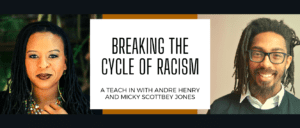
In this article, I want to address what is one of the toughest challenges in talking with white folks about race: their tendency to turn any discussion or controversy about race into something else—a process I call White Deflection.
Trump and the NFL
At a political rally in Alabama, President Trump reignited a controversy that had faded in the public eye when he called out Colin Kaepernick and other National Football League (NFL) players who used the national anthem as an opportunity to call attention to police violence against persons of color.
During the preseason to the 2016 season, Kaepernick began taking a knee during the anthem in protest, and in so doing he became a lightning rod of controversy over this nonviolent act of resistance. While Kaepernick repeatedly emphasized his taking a knee was to call attention to police brutality, he was criticized by fans, other players, owners, and the media for disrespecting the military. Kaepernick sought to reiterate his reasons for kneeling, largely to no avail. After being released by the San Francisco 49ers, Kaepernick was not able to find a team willing to even give him a tryout. This “blackballing” effort by NFL owners caused several civil rights organizations and leaders to call for a boycott of the NFL season. While other players, like Malcolm Jenkins of the Philadelphia Eagles, have had their own protest, such acts and the boycott went largely unnoticed except to those participating.
How does a simple, non-violent, silent protest by African-American athletes become a controversy around the meaning of patriotism?
However, the president revived the issue when he suggested that NFL owners should fire any player who protested, only this time the charge was not disrespecting the military but disrespecting the flag. In response, nearly every team took a knee, locked arms or stayed in the locker room in defiance of the President’s baseless and unwarranted attack. (And by the way, the candidate on whose behalf he was speaking lost the primary election.)
However, my focus in this blog is not the antics of #45, but the manner in which a simple, non-violent, silent protest by mostly African-American athletes became a controversy around the meaning of patriotism.
Black Lives Matter
Much the same sort of reaction occurred in 2014, when a Twitter handle, #BlackLivesMatter, became a flashpoint of criticism by many white folks following the shooting of Ferguson, Missouri teenager Michael Brown by officer Darrin Wilson. In the weeks and months following the shooting of Michael Brown and the subsequent dismissal of any chargers against Officer Wilson, there were Black Lives Matter (BLM) marches all over the country and even across the world. While the marches were deeply emotionally, they were overwhelmingly peaceful—but political leaders and the media focused on the few unfortunate incidents where violence was used and some police officers were shot in Dallas, New York, Philadelphia and elsewhere.
Critics of the emerging movement took issue with the phrase “Black Lives Matter,” insisting instead that “All Lives Matter” and also that “Blue Lives Matter.” Like in the case of Colin Kaepernick, these critics did not want to hear the explanation given by BLM’s leaders: that they were protesting unjustified police violence against persons of color and were affirming that Black lives mattered, because people of color had suffered this kind of injustice for decades before it came in the public view, and so wanted to say their lives mattered as much as anyone else. Again, critics turned it into an issue of disrespect for government authority rather than a call to notice racial injustice.
White Deflection
Those of us who want to talk with our white friends about groups like BLM and protest actions like that of the NFL players need to realize that what is going on is more than simple confusion. Rather, we need to recognize that when issues of race are raised, there is often a subconscious, automatic response on the part of white people to try and reframe the issue into something other than race. This white deflection is facilitated by what author and legal scholar Ian Haney Lopez calls “dog whistle politics.” Lopez explains that in its simplest form, dog whistle language “simply means speaking in code [about race] to a target audience.”
So, instead of acknowledging an athlete protesting police brutality against people of color, critics say the player is disrespecting the military, dishonoring the flag, or being unpatriotic. When BLM activists march to protest the shooting of a Black victim by a police officer, instead of holding the officer accountable, critics say that BLM is fomenting violence against police and disrespecting law and order.
This tendency to use coded language was perfectly illustrated by the president after African-American players began to defy his call on owners to fire the players. He tried to clarify, by stating: “This is not about race, it’s is about respecting the flag.” So “respecting the flag” became a deflection from what players saw as a racial protest. Lest we think this is a new phenomenon, Lopez provides numerous examples of how white leaders, politicians and the media have used this coded language for decades. In fact, it is so prevalent, whites can pretty much instantly deflect the conversation away from race, and truly believe they are doing so in good conscience.
In trying to talk with white folks about issues like the Kaepernick controversy or Black Lives Matter, we must realize that we are contending not only with an individual who is afraid to acknowledge race and racism, but also with a white culture ill-equipped to address issues of inequality, unjust treatment, biased institutional practices, media images and much more that consistently degrade and undermine the ability of people of color to access the rights and privileges supposedly afforded all US citizens. All the NFL players and the BLM activists are seeking to do is exercise their Constitutional rights to free speech—and they are not asking for permission, because they assume that such rights belong to them as much as they do to every white citizen. Yet, the common reaction of many white folks to these actions reveals that they don’t really believe people of color should have those rights, or choose to exercise them in ways that might make white folks examine the issues and/or feel uncomfortable.
Some Suggestions for Challenging White Deflection
In talking with white folks, we need to realize we are up against a huge mountain of culturally reinforced bias, and while we wish we could come in with a rhetorical wrecking ball and destroy the mountain in one blow, in reality what we need to do is chip away at it persistently.
What might that chipping away look like?
First, we must not allow ourselves to be dragged into arguments about the flag, the military, or patriotism, because that is not the issue. The issue is the unjust treatment of people of color. We need to not only be informed, but also stand firm, realizing that our white friends and family will often deflect to other issues.
Second, we must realize that for many white folks the kinds of stories routinely shared by people of color in their interactions with law enforcement are totally outside of the white experience. We need to know some of those stories to share with them ourselves. For instance, I often share the story of a Black colleague who was stopped by police for a broken taillight, and spent three days in jail because he respectfully questioned the officer’s harsh treatment. We must stress that we are not making this stuff up—these events are common for people of color, not the exception.
Third, we need to try and help white folks put themselves in the shoes of people of color. When talking about race with a group of whites, I will sometimes ask: “How many of you have had ‘the talk’ when you were kids?” A few hands will go up, and when I ask what “the talk” was about, they usually share that it had something to do with sex. Then I explain that “the talk” for people of color is much different. For people of color, “the talk” is usually strong advice on how to act when stopped or questioned by a police officer, so that the child won’t be imprisoned or shot. I ask, what would it be like for us white folks if we had to assume we were going to be routinely stopped by law enforcement, and that such incidents could be life-threatening? I challenge white folks to put themselves in the place of the Black parent or the Latino child. I encourage them to ask a co-worker or friend of color about “the talk” and see what they say. I try to get them to put themselves in the shoes of the other.
Finally, we need to realize this is a long struggle, because this tendency toward white deflection is so deeply ingrained that it is hard for whites to recognize, admit, and remove without deliberate intent and effort. Honesty compels those of us who aspire to be white allies that even we find ourselves deflecting. So, whether it is in our own psyches or in our relationships, we need to commit ourselves to chip away at this mountain of unconscious cultural racism stone by stone.
In the end, we must accept that for many white folks race is a deeply uncomfortable subject, so uncomfortable they have developed culturally acceptable ways to avoid the topic altogether. However, if we want to be allies to our friends and colleagues of color, we must not allow the topic of race to be hijacked and redirected through the process of White Deflection. We must encourage, invite and even cajole our white friends and colleagues to face the realities that people of color face in our society every day.
Drick Boyd is Professor of Urban and Interdisciplinary Studies at Eastern University and the author, most recently, of Paulo Freire: His Faith, Spirituality and Theology. Drick’s areas of interest include urban theology, race and ethnic relations, leadership, social activism, and popular education; he is particularly focused on community issues of gun violence prevention, urban education and interfaith and inter-racial coalitions for addressing city issues. Married with three adult children, he is a cycling enthusiast, a sports fanatic, a lover of books, and a guitar player, who enjoys spending time with colleagues, friends and family.



One Response
Originally written as a Letter to the Editor which the Inquirer rejected:
I am an 84-year-old grandmother and no football fan. But I have profound regard for Colin Kaepernick and the other players who have knelt during the national anthem. Kneeling after all is a universal symbol of humility, usually during prayer. These men are disrupting nothing. They are bearing witness, with silent eloquence, to a deeper calling. They’re asking us to see, to wake up, to care about the racism and social inequalities in America. They make me think of the Prophet Amos and his cry from the heart: “Let justice roll down like waters.” Would that we had the ears to hear.